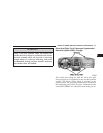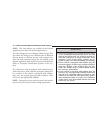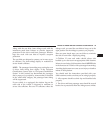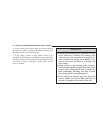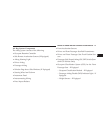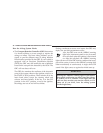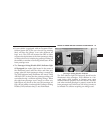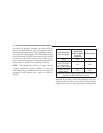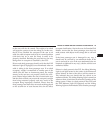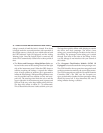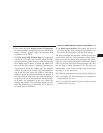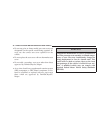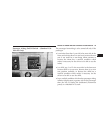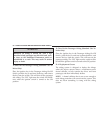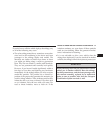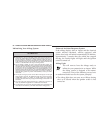
on the seat will also be sensed. The weight of an adult
will cause the system to turn the airbag on. In this case,
the OCS has classified the occupant of the seat as an
adult. An adult occupant needs to sit in a normal position
(with their feet on or near the floor) in order to be
properly classified. Reclining the seat back too far may
change how an occupant is classified by the OCS.
Drivers and adult passengers should verify that the PAD
Indicator Light (If Equipped) is not illuminated when an
adult is riding in the front passenger seat. If an adult
occupant’s weight is transferred to another part of the
vehicle (like the door or instrument panel), the weight
sensors in the seat may not properly classify the occu-
pant. Objects lodged under the seat or between the seat
and the center console can prevent the occupant’s weight
from being measured properly and may result in the
occupant being improperly classified. Ensure that the
front passenger seat back does not touch anything placed
on the second row of seats because this can also affect
occupant classification. Also in the case of a Standard Cab
Models, ensure that the front passenger seat does not
make contact with objects in the storage bin or cab back
panel.
If the front passenger seat is damaged in any way, it
should only be serviced by an authorized dealer. If the
seat is removed (or even if the seat attachment bolts are
loosened or tightened in any way), take the vehicle to an
authorized dealer.
If there is a fault present in the OCS, the Airbag Warning
Light (a red light located in the center of the instrument
cluster directly in front of the driver) will be turned on.
This indicates that you should take the vehicle to an
authorized dealer. The Airbag Warning Light is turned on
whenever there is fault that can affect the operation of the
airbag system. If there is a fault present in the OCS, both
the PAD Indicator Light (If Equipped) and the Airbag
Warning Light are illuminated to show that the passenger
THINGS TO KNOW BEFORE STARTING YOUR VEHICLE 45
2



